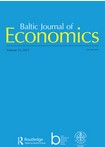Language training for unemployed non-natives: who benefits the most?
Language training for unemployed non-natives: who benefits the most?
Author(s): Laura Helena Kivi, Marko Sõmer, Epp KallasteSubject(s): Foreign languages learning, Labor relations, Migration Studies, Socio-Economic Research
Published by: BICEPS/SSE Riga
Keywords: Language skills; immigrant population; unemployment; programme evaluation; matching;
Summary/Abstract: This study evaluates the local language training aimed at the unemployed in Estonia during 2015–2016. The impact of training on employment probability and labour income is estimated by combining propensity score matching with coarsened exact matching. The impact on the probability of being employed is found to be positive after the end of the lock-in effect. Two years after the start of the language training the effect is around 8 pp. The initial lock-in effect is smaller for more flexible and shorter courses, for those with lower initial level of language skills and for those living outside of the capital region. The long-term effect is higher for those with lower level of initial language skills and does not differ by the course type or region. The results indicate that the local language training helps the unemployed non-natives to find employment, but does not give them access to higher-paying positions.
Journal: Baltic Journal of Economics
- Issue Year: 20/2020
- Issue No: 1
- Page Range: 34-58
- Page Count: 25
- Language: English

